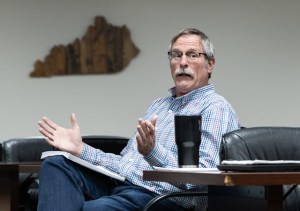City Commission: More Cooper lawsuits possible
Published 12:00 am Wednesday, November 16, 2005
The Davis Cooper embezzlement saga is not over.
Bowling Green city commissioners voted 4-0 after a closed session last night to hire a Lexington law firm to pursue unspecified “persons or entities associated with Cooper” for damages relating to his theft of city tax funds. Commissioner Mark Alcott left before the vote.
Trending
They voted to hire Sturgill, Turner, Barker & Moloney to investigate and possibly seek damages from anyone who might have contributed to Cooper’s 20-plus years of undetected embezzlement. The firm would be paid up to $125 per hour, plus expenses and 20 percent of whatever money its attorneys can recover, according to the agreement.
Cooper, the former city chief financial officer, was arrested in March when city Finance staff discovered he had been funneling payments from the city insurance premium tax into his private accounts.
He admitted stealing more than $3 million, and was sentenced to eight years in federal prison.
In the wake of that discovery, CPA Larry Williams was hired to examine the financial controls the city was putting in place and suggest further changes, to prevent anyone from being able to steal as Cooper did.
He presented a public report at last night’s commission meeting, and later met with commissioners to discuss legal action.
The major problem with city accounting was that Cooper had helped design the software system installed in 1996, Williams said.
Trending
That let Cooper enter and alter data without other employees’ knowledge, making the system seem to work fine without adding some payments to final totals, he said. The flaw has been fixed.
Cooper was also able to steal checks from the city vault after hours, Williams said. Now insurance tax receipts go to a lock box, and cameras have been installed in the vault, he said.
City Treasurer Jeff Meisel said he intends to put in lock boxes for all city tax payments, keeping them out of reach of employees on their way to the bank.
Williams advised adding further user-tracking software, and doing random audits of accounts.
The text of his public report will soon be posted on the city Web site, www.bgky.org.
Vehicles
After sharply questioning the city’s evaluation process for vehicle bids, commissioners voted 4-1 to table a $740,659.36 purchase of 23 police-package cars, a cargo van with a dog cage, and seven trucks with various features.
City staff recommended awarding the bulk of the bids – mostly for replacement police cars – to Greenwood Ford, based on comparisons of purchase price, maintenance history, expected life, customer service and a survey of users.
City Fleet Manager John Lewis said Campbell Chevrolet offered the low bid on police cars, but evaluators from various city departments found a “very stark comparison” in maintenance costs, with Impalas costing several times what it takes to maintain Ford Crown Victorias.
That comparison was presented in a report nearly two inches thick. But commissioners complained they had not had time to adequately study it.
“Are we just cutting down trees for the fun of it?” Commissioner Brian “Slim” Nash asked, hefting the bulky report.
Mayor Elaine Walker said serious questions about the evaluation process remained, and pointed out dealers with which the city has no experience got high, and varied, marks on customer service.
“I have a very difficult time making an educated decision on three-quarters of a million dollars tonight,” she said.
Public Works Director Emmett Wood said he would probably have a re-evaluation done by the commission’s Dec. 6 meeting.
Fiber network
At an afternoon work session, commissioners heard a report on the feasibility of Bowling Green Municipal Utilities building a fiber-optic-to-the-home network to carry phone service, cable TV channels and high-speed Internet.
Kim Kersey, JEA’s senior vice president for Telecommunications at Jackson Energy Authority, told commissioners – as he’d told the BGMU board Monday night – such a network would probably support itself if BGMU goes into the cable and Internet businesses for itself, but if the utility only builds a fiber network and rents space to cable, phone and Internet companies, it probably won’t break even.
Jackson Energy Authority, the public utility of Jackson, Tenn., built its own fiber network in 2004, and provides cable TV service itself. The utility was hired to study the idea’s practicality here.
JEA did a phone survey of BGMU customers, and found a substantial majority had at least some interest in all three services on fiber-optic, Kersey said.
JEA studied three types of possible fiber networks:
- A retail model, in which BGMU would not only build the fiber network but become a cable company, phone company and Internet service provider itself;
- An open-access model, in which BGMU would build the network and rent space on it to competing cable, phone and Internet companies; and
- A hybrid model, in which BGMU would offer at least one service – cable TV, and possibly Internet – itself, and rent space to competing phone companies.
The utility should be able to make retail or hybrid services pay for themselves, but an open network would probably always run in the red, Kersey said.
A retail model would likely require a $43 million bond issue to build and operate, while a hybrid network would run $41 million, he said. An open network would cost the least, at $30 million, but also would give BGMU the least control over service and billing, Kersey said.
He recommended a hybrid system, with BGMU providing TV and Internet service and doing all marketing and billing.
Commissioner Brian Strow asked what would be the ultimate goal of getting BGMU into the fiber-to-the-home business.
It would speed the arrival of high-volume, high-tech information services in Bowling Green, Kersey replied. Otherwise, it might take years to get local services at the level many large cities have – and those services should help attract high-tech businesses, and give local small businesses the same information access as large companies, he said.
Strow asked why JEA doesn’t offer Internet services, since Kersey recommends BGMU offering them.
Kersey said they wanted to, but a local Internet provider sued, and the idea was dropped to avoid slowing the financing process.
Strow then asked if Kersey expected BGMU would offer adult programming on pay-per-view channels, if it owns its own cable company.
Kersey said JEA does, but doesn’t promote it, and assumed that BGMU would as well.
Before JEA built its fiber system, Walker asked, how many cable, phone and Internet providers did Jackson have, and what happened to them?
Jackson had one cable company, BellSouth and eight or nine Internet services, and all are still operating, Kersey said.
Rick Williams, general manager of Insight Communications, cautioned commissioners to be careful not to invest in technology that might soon be outdated.
“You’re talking about 40-plus million dollars to spend,” he said.
He was seconded by Jan Allis, partner with John Baldwin in local Internet company Access Kentucky.
Access Kentucky seeks to eventually provide citywide wireless Internet, Allis said. The Federal Communications Commission is now debating what to do with the bandwidth now assigned to analog TV programming when TV broadcasts are required to go digital in 2008, he said.
If that is assigned to the Internet, companies like his can provide phone and video over the airwaves, which might make those services over fiber irrelevant, Allis said.
Tasers
Commissioners unanimously approved city police policies allowing the purchase and use of Tasers, to be issued to all traffic, patrol and animal control officers, and supervisors.
Citizens’ survey
Ninety percent of Bowling Green residents recently surveyed said the city is a good or excellent place to live, according to John Parker of The Kentucky Poll.
He summarized results of the Oct. 21 phone survey on local government and services, a poll taken every two years.
A total of 201 people were questioned: 131 women and 70 men, Parker said.
In declining order of importance, Bowling Green’s size, friendly people and location were the biggest reasons people like it here, he said.
But they viewed traffic, reckless spending, corruption and street conditions as the most serious problems facing city government, and said city officials aren’t dealing as well with those issues as when the poll was last taken, Parker reported.
The full poll results are posted on www.bgky.org.







